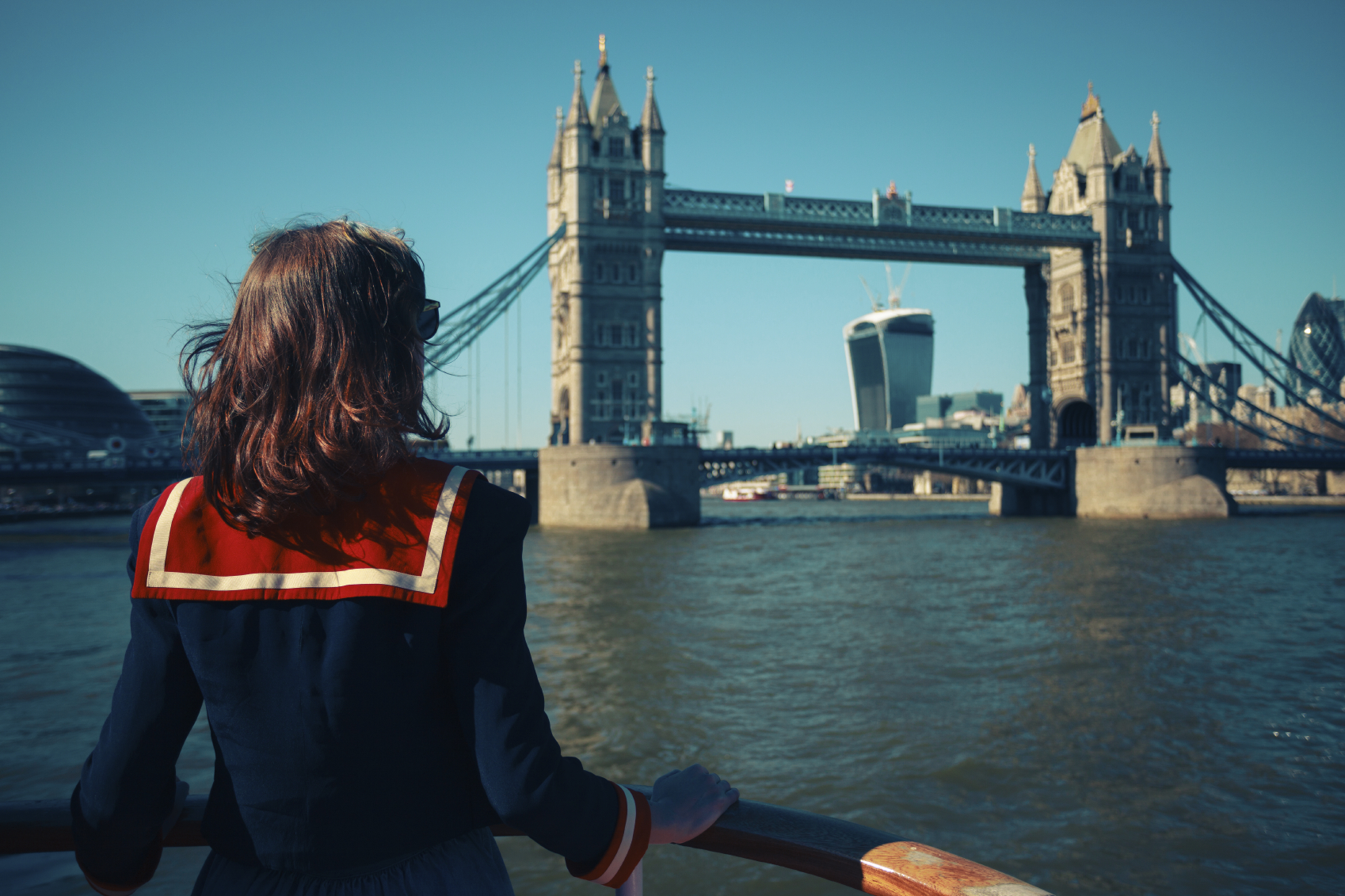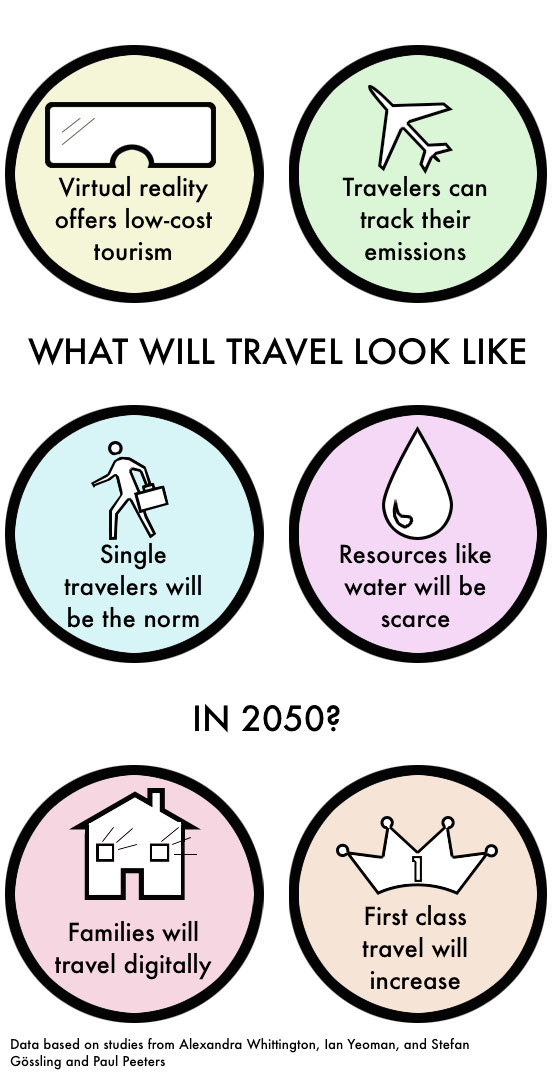Why the American tourist could become virtually unrecognizable by 2050
Part of our series on America in 2050...

A free daily email with the biggest news stories of the day – and the best features from TheWeek.com
You are now subscribed
Your newsletter sign-up was successful
Travel for fun is big business. Tourists poured roughly $7 trillion into the global economy in 2013 and funded more than 200 million jobs worldwide, according to data from the World Travel and Tourism Council, which monitors the industry. And demand isn't slowing down: The council estimates 4 percent growth every year for the next 10 years.
But some researchers are exploring the longer-term future of one of the world's biggest industries, puzzling through what tourism could look like as the world's population rises and the effects of climate change potentially make global travel unsustainable. According to their studies, the tourist of 2050 will likely be wealthy, adventurous, and increasingly alone. Families and travelers with less resources meanwhile may find themselves seeing the world through technology in their living room.
"I think technology is a huge driving force for change up to 2050," said Alexandra Whittington, a futurist at the University of Houston who has studied travel trends. "The other force is more of a demographic change. The individual consumer is rising up as a more competitive consumer than the family."
The Week
Escape your echo chamber. Get the facts behind the news, plus analysis from multiple perspectives.

Sign up for The Week's Free Newsletters
From our morning news briefing to a weekly Good News Newsletter, get the best of The Week delivered directly to your inbox.
From our morning news briefing to a weekly Good News Newsletter, get the best of The Week delivered directly to your inbox.
The solitary tourist
The single tourist is becoming more and more common as American families choose to have fewer children, according to research Whittington published last year which explored several different scenarios for future tourists. If environmental and political instability increased over the next decades, traveling alone could potentially be the safer option, she noted.
In this scenario, individual travelers with high budgets would be attractive guests overseas, while hotels and tour providers would discourage families and large groups. Travelers could monitor their individual environmental 'footprint' as worldwide concern over environmental impacts ratcheted up.
The family vacation, brought to you by Oculus VR
A free daily email with the biggest news stories of the day – and the best features from TheWeek.com
In another scenario, families could take advantage of a boom in virtual reality technology to travel without the expense or uncertainty of leaving home, something Whittington says can already be seen with the growth of virtual reality firms like Oculus VR, which was bought by Facebook in 2014. The family vacation, thus, would largely be a virtual experience and a respite from "real world" stress, but also a departure from the halcyon past of family trips.

Why the wealthy shall inherit the earth...
Other scholars who have studied the possible tourists of the future have reached similar conclusions. A 2011 study by British futurist Ian Yeoman concluded that tourists in 2050 will likely be wealthy travelers from non-Western nations, as the economies in places like China will continue to grow. But, he noted, travel will still be a challenge, even for the wealthy, as oil and fuel shortages will make global travel scarce and expensive.
... unless climate change stops them
And then there's the ongoing environmental impact of people traveling for pleasure. Research published earlier this year by Swedish and Dutch researchers predicted the tourism industry would consume 92 percent more water and 189 percent more land between the years 2010 and 2050.
Air travel, also, will continue to have an environmental impact as more consumers take to the skies. And despite increasing environmental awareness, travelers typically don't weigh the environmental cost very heavily when making travel plans, according to Stefan Gössling, a co-author of the research.
He also says trends don't bode well for a sudden shift to a more environmentally aware traveling public. For one, he says, the world's population is increasing at the same time as the average flying distance is also growing. And the tendency to fly first class is also less energy efficient than flying economy.
But if it sounds like the stereotype of the ugly American tourist is only going to get uglier in the future, researchers aren't that pessimistic. Whittington notes that the generation that are kids today — Generation Z — will be parents in 2050. Having grown up as the first fully digital Americans, she says their outlook and perspective may be more tolerant and aware than past generations, which could shape their travel decisions.
"This is really their future," she said. "They are very multicultural, very curious about the world. They are being handed the world in a smartphone at a very young age. That's going to make them very different from us."
Matt Hansen has written and edited for a series of online magazines, newspapers, and major marketing campaigns. He is currently active in press freedom and safety research with Global Journalist Security.
-
 Film reviews: ‘Send Help’ and ‘Private Life’
Film reviews: ‘Send Help’ and ‘Private Life’Feature An office doormat is stranded alone with her awful boss and a frazzled therapist turns amateur murder investigator
-
 Movies to watch in February
Movies to watch in Februarythe week recommends Time travelers, multiverse hoppers and an Iraqi parable highlight this month’s offerings during the depths of winter
-
 ICE’s facial scanning is the tip of the surveillance iceberg
ICE’s facial scanning is the tip of the surveillance icebergIN THE SPOTLIGHT Federal troops are increasingly turning to high-tech tracking tools that push the boundaries of personal privacy
-
 The billionaires’ wealth tax: a catastrophe for California?
The billionaires’ wealth tax: a catastrophe for California?Talking Point Peter Thiel and Larry Page preparing to change state residency
-
 Bari Weiss’ ‘60 Minutes’ scandal is about more than one report
Bari Weiss’ ‘60 Minutes’ scandal is about more than one reportIN THE SPOTLIGHT By blocking an approved segment on a controversial prison holding US deportees in El Salvador, the editor-in-chief of CBS News has become the main story
-
 Has Zohran Mamdani shown the Democrats how to win again?
Has Zohran Mamdani shown the Democrats how to win again?Today’s Big Question New York City mayoral election touted as victory for left-wing populists but moderate centrist wins elsewhere present more complex path for Democratic Party
-
 Millions turn out for anti-Trump ‘No Kings’ rallies
Millions turn out for anti-Trump ‘No Kings’ ralliesSpeed Read An estimated 7 million people participated, 2 million more than at the first ‘No Kings’ protest in June
-
 Ghislaine Maxwell: angling for a Trump pardon
Ghislaine Maxwell: angling for a Trump pardonTalking Point Convicted sex trafficker's testimony could shed new light on president's links to Jeffrey Epstein
-
 The last words and final moments of 40 presidents
The last words and final moments of 40 presidentsThe Explainer Some are eloquent quotes worthy of the holders of the highest office in the nation, and others... aren't
-
 The JFK files: the truth at last?
The JFK files: the truth at last?In The Spotlight More than 64,000 previously classified documents relating the 1963 assassination of John F. Kennedy have been released by the Trump administration
-
 'Seriously, not literally': how should the world take Donald Trump?
'Seriously, not literally': how should the world take Donald Trump?Today's big question White House rhetoric and reality look likely to become increasingly blurred